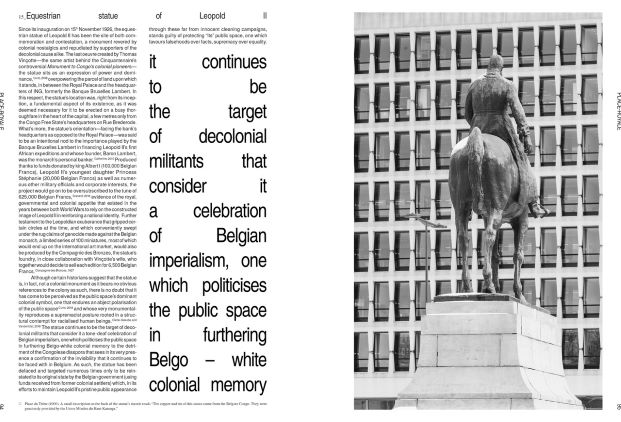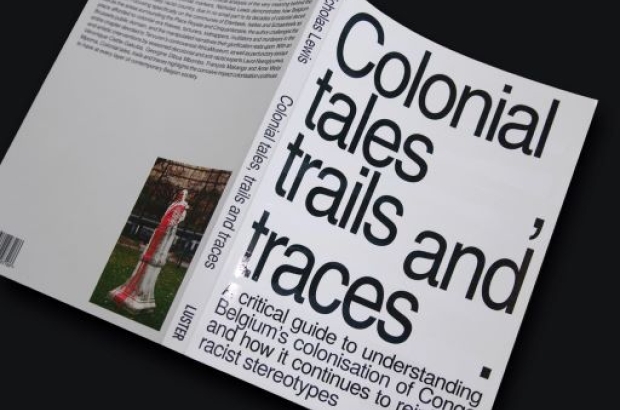- Daily & Weekly newsletters
- Buy & download The Bulletin
- Comment on our articles
Book review: Colonial tales, trails and traces by Nicholas Lewis
Nicholas Lewis’ Colonial tales, trails and traces is both a guide to Brussels’ colonial markers – an essay collection on the modern-day Congolese-Belgian experience – and a series of artist interventions.
It largely consists of dozens of encyclopaedia-style entries on the Brussels monuments, metro stations, squares and streets that reference key events and figures in Belgium’s colonisation of modern-day DRC, Rwanda and Burundi. These living reminders confer a memorial stamp of approval to an enterprise that is believed to have cost the lives of 10 million people.
The seemingly deliberate repetitiveness of the entries is lethal in the message it gradually and methodically establishes, namely that Brussels’ urban space is suffused with colonial imprints; nods to the “military men and mercenaries” that played a role in Belgium’s violent colonisation of Congo.

Lewis, the Brussels-based founding editor of The Word Magazine, adopts a similar factfinding technique in an especially insightful chapter on the recent renovation of the AfricaMuseum in Tervuren. Through a room-by-room analysis of opportunities missed and of outdated anthropological approaches maintained, he offers a blistering takedown of the museal choices that by and large continue to present Congo and its population as “something of a commedia dell’arte”.
The entries on Brussels and the AfricaMuseum are interspersed with a series of short essays by mostly female Belgian-Congolese voices from academic, creative and activist circles. They contribute compelling personal perspectives – from what it’s like to work for the AfricaMuseum as a guide with Congolese roots, to a reflection on militancy and hope by poet Joëlle Sambi Nzeba post-Black Lives Matter.
Among the most powerful is a contribution by Anne Wetsi Mpoma who reflects on whom museums perceive to be their audience, as well as how museal representations continue to reproduce colonial power relations and narratives. Lewis’ decision to include essays from all these decolonial thinkers is nevertheless regrettable as it results in a few decidedly academic texts, further weighing down an already dense read. The inclusion of an occasional Q&A would have not only made the book more digestible, it also would have also given further justice to these voices, each compelling in their own right.
There’s a final welcome series of mesmerising photographs of performance works by Laura Nsengiyumva – best-known for her Queen Nikkolah persona, a subversion and response to the folkloric figure of Saint Nicholas – in which the artist twists, squeezes and knees a faceless, human-sized white doll. There’s a comic quality but also exhilarating joyousness to these interventions that lighten this otherwise dispiriting but must-read book.
Colonial tales, trails and traces by Nicholas Lewis
Published by Luster in English and Dutch

















